
Linen is considered a sustainable and environmentally conscious choice of fabric for home furnishings due to several reasons:
-
Renewable and Biodegradable: Linen is made from the fibers of the flax plant, which is a renewable resource. Flax plants require less water and fewer pesticides compared to other crops used in textile production. Additionally, linen is biodegradable, meaning it can naturally decompose at the end of its lifecycle, reducing its environmental impact.
-
Low Environmental Impact: The cultivation of flax plants for linen production has a lower environmental impact compared to other fiber crops. Flax plants can thrive in poor-quality soil, reducing the need for chemical fertilizers. They also have a smaller carbon footprint and lower water usage compared to crops like cotton.
-
Minimal Chemical Usage: Linen production typically requires fewer chemicals, such as pesticides and herbicides, compared to other fabrics. Flax plants are naturally resistant to pests and diseases, reducing the need for chemical interventions. Furthermore, linen is often produced using mechanical processes rather than chemical treatments, reducing the environmental burden.
-
Durability and Longevity: Linen is known for its durability and longevity. Linen fabrics are inherently strong and can withstand frequent use and washing without losing their quality. By choosing linen for home furnishings, you can reduce the need for frequent replacements, which contributes to a more sustainable lifestyle.
-
Energy Efficiency: The production of linen fabric typically involves less energy compared to other textiles. The processing of flax fibers requires fewer mechanical and chemical treatments, resulting in lower energy consumption during production.
-
Versatility and Timelessness: Linen has been used for centuries due to its versatility and timeless aesthetic. By selecting linen for home furnishings, you can create a classic and long-lasting interior design that transcends trends, reducing the need for frequent updates.
While linen does have its sustainability advantages, it's worth noting that the overall sustainability of any fabric depends on various factors, including cultivation practices, processing methods, and supply chain transparency. It's important to consider the entire lifecycle of a product and opt for responsible sourcing and manufacturing practices to make truly sustainable choices. Here at Ink & Spindle we source all of our linen from a Certified Belgian Linen mill that is carbon neutral and solar powered. We have a direct relationship with our mill which gives us the confidence that we are sourcing our textiles from a reputable, ethical source.